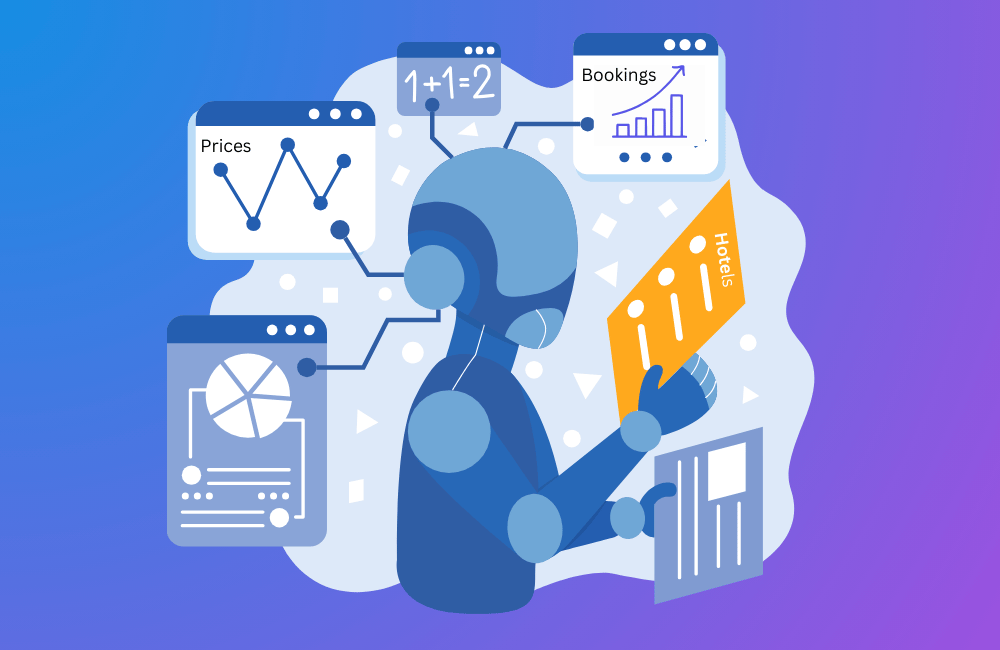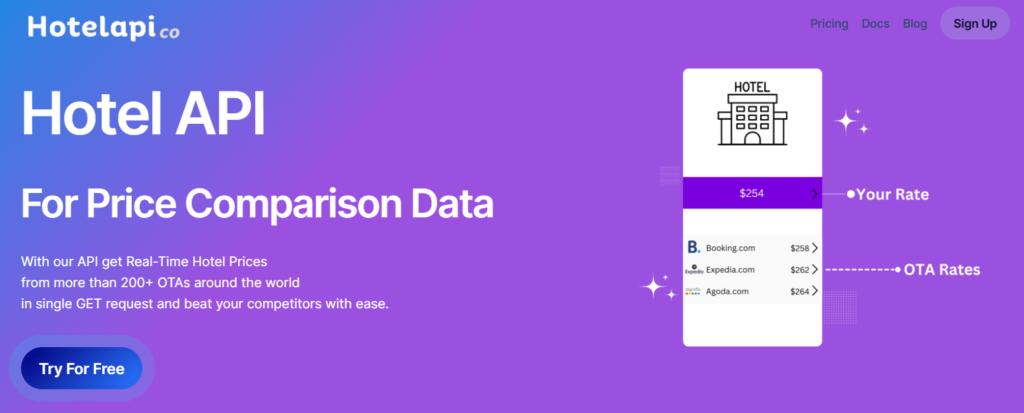
Let’s be real—every hotel wants more direct bookings. Why? Because relying on Online Travel Agencies (OTAs) comes at a steep price. These platforms charge commission fees of 15%-30% which can cut serious hotel profits. But here’s the kicker: while OTAs help travelers discover hotels, they don’t have to be the final stop.
Expedia’s Path to Purchase Research shows that 80% of travelers use an OTA in the 45 days before making a booking. That means guests are searching, comparing, and considering their options long before they hit that “Book Now” button. The opportunity? Hotels that leverage data intelligence can guide potential guests away from third-party sites and straight to their own booking engines. It helps to save on commissions and build stronger guest relationships in the process.
By tracking search trends, understanding booking behaviors, and analyzing guest preferences and real-time pricing trends hotels can create targeted strategies that drive direct reservations.
In this guide, we’ll break down how to collect, analyze, and apply hotel data intelligence to boost direct bookings and maximize profitability.
Let’s dive in.
What is Hotel Data Intelligence?
Hotel data intelligence is the smart use of data to make better business decisions. Simply put, it helps hotels attract more direct bookings and depend less on OTAs.
Every time a traveler searches and compares prices or abandons a booking, they leave behind valuable clues. Data intelligence helps hotels track these patterns to see what’s working and how to turn more visitors into direct bookers.
By analyzing booking trends, guest behavior, and pricing insights, hotels can create targeted marketing, personalized offers, and competitive rates to keep more revenue in their pockets instead of paying OTA commissions. This leads to less reliance on third parties and more direct revenue, and stronger guest relationships.
Types of Hotel Data That Impact Direct Bookings
The right data can be a game changer for direct bookings. Hotels that track and analyze key insights can fine-tune their strategy, attract more guests, and reduce reliance on OTAs.
Here’s what really matters:
Guest Data – Your guests are the first step to getting more direct bookings. The data of their past stays, demographics, and preferences help you create personalized offers, targeted emails, and loyalty perks that bring them back—without an OTA in the middle.
Booking Data – Understanding how and when guests book makes it easier to shift reservations from OTAs to direct channels. Track trends like seasonality, length of stay, and lead times will allow hotels to adjust pricing, promotions, and availability to capture more direct sales.
Pricing Data – Competitive pricing is key. By monitoring historical trends, real-time demand, and competitor rates, hotels can set prices that attract direct bookings while staying competitive with OTAs. Smart pricing strategies can persuade guests to book with you directly.
Marketing Data – Website traffic, ad engagement, and conversion rates reveal what’s driving direct bookings and what’s not. Optimizing campaigns based on real data ensures marketing dollars are spent on strategies that actually convert.
Review & Sentiment Data – Guest feedback shapes booking decisions. Positive reviews build trust, while negative ones highlight areas for improvement. Leveraging sentiment data analysis will give you an online reputation boost confidence and encourage more guests to book directly with you.
Use Data to Understand and Target the Right Guests
Understanding and targeting the right guests is crucial for hotels aiming to boost direct bookings. By leveraging guest data and optimizing advertising strategies, hotels can create personalized experiences that resonate with their audience.
Leverage Guest Data for Personalized Marketing
- Segmenting Guest Profiles: Categorizing guests into groups like business travelers, families, or repeat visitors allows hotels to tailor offerings to each segment’s unique needs. For instance, business travelers might appreciate express check-in services, while families could be interested in kid-friendly amenities.
- Predicting Booking Intent: Analyzing past behaviors helps in anticipating future actions. If a guest frequently books spa services, offering them a special spa package can encourage repeat bookings. This proactive approach enhances guest satisfaction and loyalty.
- AI-Powered Email Marketing: Utilizing AI to craft emails with dynamic content based on individual guest interests ensures that communications are relevant and engaging. Personalized messages, such as recommending local events during their stay, can significantly increase open rates and conversions.
Optimize Advertising and Retargeting Using Data
- Retargeting Abandoned Bookings: Guests who leave mid-booking are prime candidates for retargeting. Sending them reminders or special offers can nudge them to complete their reservation and help in recovering potential lost revenue.
- Data-Driven PPC & Social Media Campaigns: Analyzing guest interactions allows hotels to design pay-per-click and social media ads that align with user interests and behaviors. This targeted approach ensures marketing budgets are spent effectively, reaching those most likely to book directly.
- AI-Powered Chatbots: Implementing chatbots to address pre-booking questions provides immediate responses that enhance the user experience. Quick, accurate answers can reduce hesitation which leads to higher conversion rates.
Price Optimization Through Data Intelligence
Optimizing hotel pricing through data intelligence is essential for increasing direct bookings and reducing reliance on Online Travel Agencies (OTAs).
Here is how you can do this: –
Access Real-Time Pricing Data
To stay competitive, hotels need up-to-date information on room rates across various platforms. Our Hotel API offers real-time pricing data from over 200 OTAs.

This API provides two primary functionalities:
- Hotel-Specific Pricing on Different Platforms: By inputting a specific hotel’s ID, the API returns pricing details from multiple OTAs for that hotel. This allows hotels to see how their rates compare on different platforms and adjust accordingly.
- City-Wide Pricing: By entering a city ID, the API provides pricing information for various hotels within that city, including vendor names and average review ratings. This broader view helps hotels understand the competitive landscape in their area.
To utilize these features, you need to first use the Hotel Mapping API to obtain the necessary hotel and city IDs.
Access Historical Pricing Data
Understanding past pricing trends is crucial for strategic planning. The Makcorps Historical Pricing Data API offers access to pricing data from 2010 to the present.
This resource enables hotels to:
- Analyze Seasonal Trends: Identify peak and off-peak periods to optimize pricing strategies.
- Monitor Competitor Pricing: Understand how competitors have adjusted their rates over time.
- Forecast Demand: Use historical data to predict future booking patterns and set prices accordingly.
How to Use Hotel Pricing Data to Boost Direct Bookings
With comprehensive pricing data, hotels can develop targeted strategies that maximize revenue without sacrificing profitability. Pricing too high can drive guests to competitors, while pricing too low can erode profits. Data intelligence ensures hotels find the right balance by understanding market trends and guest expectations.
- Dynamic Pricing Adjustments: Regularly update room rates based on real-time data to remain competitive and attract price-sensitive guests.
- Exclusive Direct Booking Offers: Utilize historical data to create promotions that appeal to guests, such as discounts during traditionally slower periods.
- Personalized Loyalty Programs: Analyze guest spending habits to offer tailored rewards for direct bookings which enhance guest satisfaction and loyalty.
- Customized Package Deals: Bundle services and amenities based on guest preferences to add value to direct bookings.
- Automated Best-Price Guarantees: Implement tools that ensure the best available rates are offered on the hotel’s direct booking channels, reducing the appeal of OTAs.
Enhance the Booking Experience with Data
Optimizing the booking process with data helps hotels increase direct bookings, reduce OTA reliance, and boost profitability. Smart website design and automation improve conversions while personalizing the guest journey.
Follow this to implement:-
Optimize the Hotel Website for Data-Driven Conversions
- Heatmaps & A/B Testing: Identify user behavior, refine layouts, and improve conversion rates.
- AI Chat & Recommendations: Chatbots provide instant support, while recommendation engines personalize guest experiences.
- Real-Time Data Tracking: Identify booking friction points and optimize the process for seamless reservations.
Automate the Guest Journey with Data
- Pre-Stay Emails & Upsells: Use past stay data to offer relevant upgrades and extras.
- CRM-Driven Check-Ins: Personalize guest experiences by recognizing preferences and loyalty.
- AI Chatbots for FAQs: Answer guest queries instantly reducing hesitation and increasing direct bookings.
How to Measure Your Success And Continue Optimization
Tracking and optimizing key performance metrics is essential for hotels looking to grow direct bookings and reduce OTA dependency. By continuously analyzing data, hotels can refine their pricing, marketing, and guest engagement strategies for sustained growth.
Key Data Metrics for Evaluating Direct Booking Growth
- Direct Booking Conversion Rate: Measures how many website visitors complete a direct booking it helps hotels assess the effectiveness of their website and marketing efforts.
- Customer Acquisition Cost (OTA vs. Direct): Compares the cost of acquiring a guest through OTAs versus direct channels and highlights areas where marketing spending can be optimized.
- Repeat Guest Booking Trends: Tracks retention rates and the effectiveness of loyalty programs help hotels create targeted incentives for repeat direct bookings.
Make Data-Driven Adjustments for Long-Term Growth
- A/B Testing for Booking Pages & Promotions: Hotels can experiment with different layouts, CTAs, and offers to identify the most effective strategies for boosting conversions.
- Predictive Analytics for Guest Behavior: Analyzing past booking trends allows hotels to anticipate demand, personalize marketing efforts, and optimize inventory management.
- Data-Driven Adjustments: Regularly refining pricing, promotions, and loyalty incentives based on real-time insights ensures continuous improvement in direct booking performance.
Conclusion
Hotel data intelligence is the key to growing direct bookings and reducing reliance on OTAs. By leveraging real-time pricing insights, optimizing the booking experience, and continuously tracking key metrics, hotels can attract more direct guests while increasing profitability.
Long-term success comes from data-driven decisions such as – understanding guest behavior, adjusting pricing strategically, and refining marketing efforts. Instead of losing revenue to high OTA commissions, hotels that invest in smart data tools can take control of their bookings and maximize direct revenue.
Start using hotel data intelligence today to improve conversions, build guest loyalty, and drive sustainable growth. Explore advanced hotel data tools to stay competitive and keep more profits in-house!
